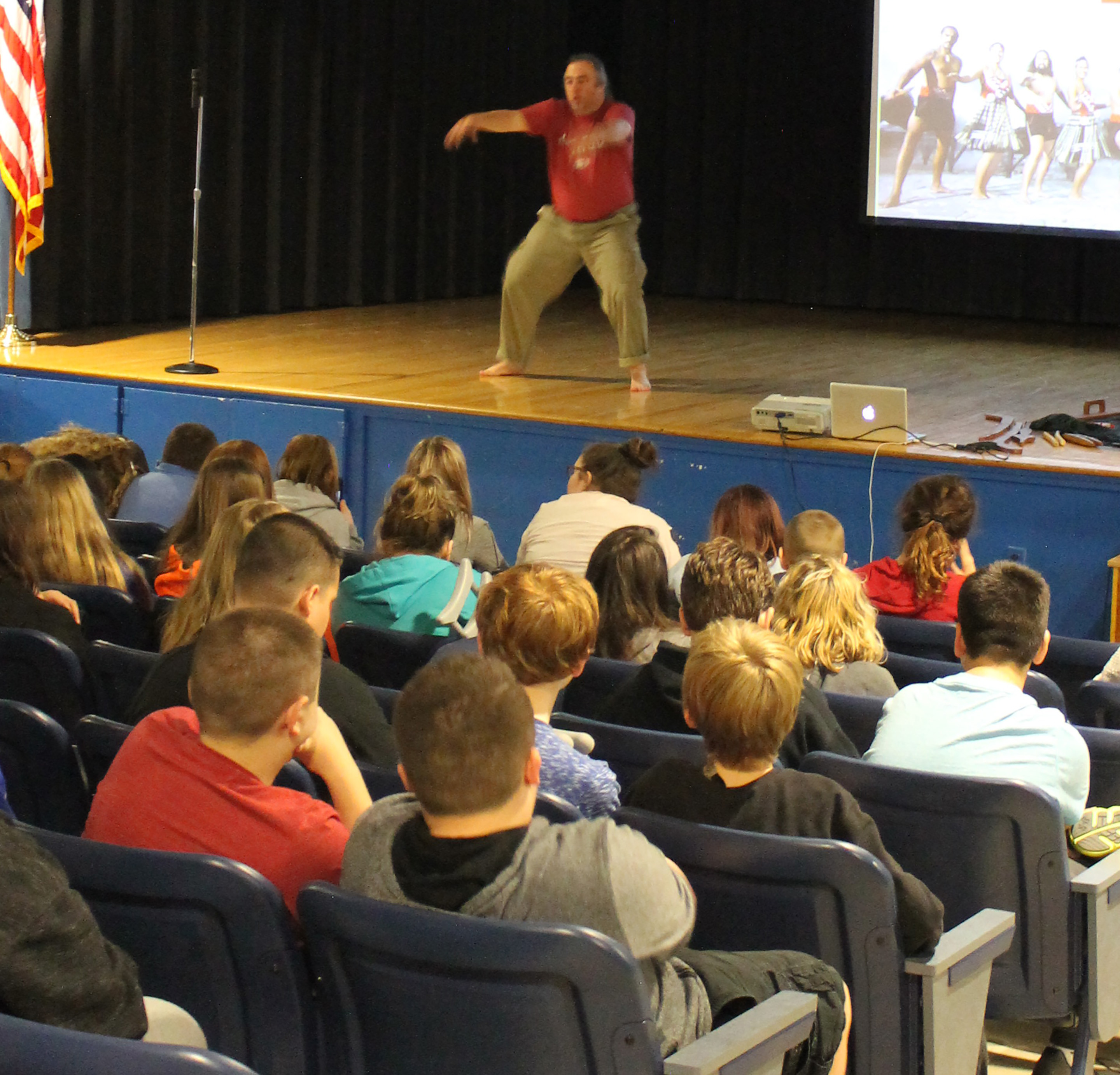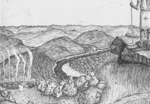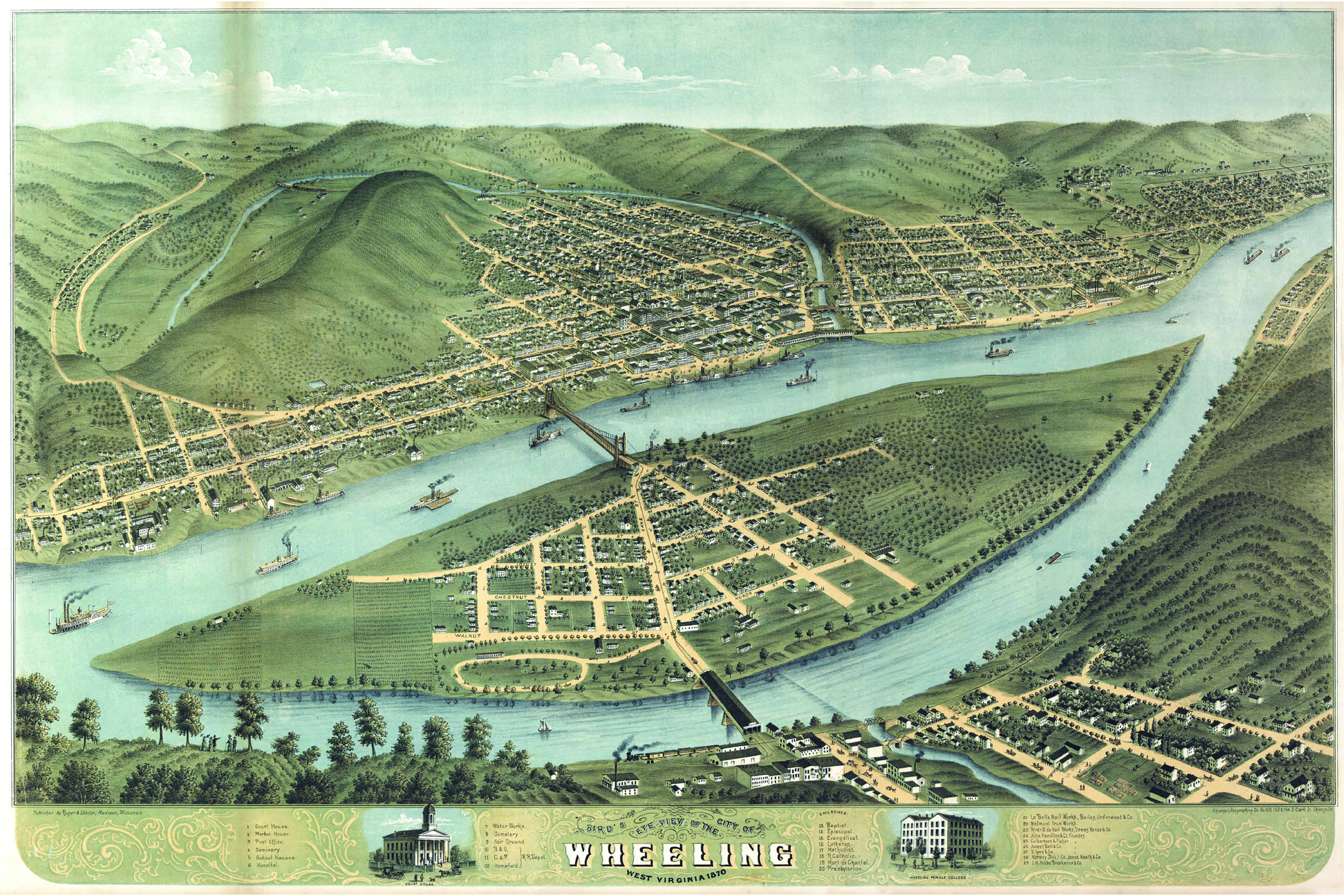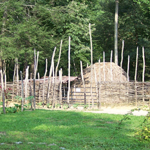Demetria and Theodoric:The Sacking of Rome, Aug. 24, 410 AD
By: Dr. Isaac Emrick
Demetria didn’t sleep much the night before that horrible late summer day. She had tossed and turned as the barbarians gathered outside the gates of Rome for yet another attempt at the Salarian Gate to the north and east of her Palatine hill home. Demetria (Duh-meet-Tree-ah), as the daughter of a high-ranking Roman diplomat, was being protected by three well-paid and loyal Gallic mercenaries and four Hibernian slaves. Even at fourteen, Demetria was commanding and strong-willed and refused her protectors’ repeated attempts to get her to leave. She had promised to stay and manage the estate for her father. Her mother had been captured in the first siege of Rome making her the woman of the house, a task she took very seriously.
From the safety of the white stucco walls and red brick roof, she could see and hear the dangerous rumblings off in the north. She was also keeping an eye on the path to the Tiber River a short distance away along the walls of Rome. That was her only escape route.
The attacks against Rome had been non-stop for nearly two weeks but the sieges on the city were all she had ever known since her birth. Thousands of barbarians from the far north and east of Emperor Julius Caesar’s former victories had been welcomed into the empire only to repay our kindness with bitter attacks killing hundreds of thousands as they rolled towards Rome, our great motherland. Our great emperor, Honorius, had been forced to move the Senate and the entire government out of Rome to the protected swamps of Ravenna. We assumed that from that safe place he would send legions to support and protect our city, but they never came. We were alone and the walls were about to collapse under the attacks by Alaric, the king of the Visigoths, and his many men and mercenaries.
As the sun began to rise over the city walls of Rome, the light poured into a city full of poor hungry and dirty Romans where once there had been bustling prospering citizens. The smell of death, decay, and burning filled every breath with fear, anger, and bitterness. Boom! Screams! Bells began tolling!
Demetria looked out the window to witness the smoke rising from the buildings closest to the Salarian Gate. She heard only one sharp command “Evadite!” from her protectors, this time she knew she had no choice but to leave. She ran out to the door surrounded by her Hibernian slaves and flanked by the Gallic men with thick swords drawn. Sweat weighed down her once brilliant white silk tunic now dirty brown and dragging the ground. The slaves carried a few bags of her belongings. The crew was hard to miss and a huge target for the raiders pouring in through the gate. So, the commanding Gallic mercenary separated Demetria from the slaves, threw a bag of things at her, and began running towards the river. The rest of the crew split off and would meet Demetria at the river, at least that was the plan. Demetria could not recall the Gallic warrior’s name who was currently guiding them through the city. She did not linger long on that thought as her eyes darted back and forth taking in the early stages of carnage beginning to pop up in her once clean and happy neighborhood. She saw flashes of beastly men wearing barely more than tattered cloth with strange designs. Their skin was already stained with blood and smoke from their rampaging in Rome. Under her breath she vowed to the Christ-god that she would find a way to avenge the desecration of her home.
---------------------------------
Theodoric (The-oh-door-ick) had to step over the bodies of dead Visigoth compatriots and brothers to step through the stone archway of the Salarian gate into the famed Roman capital. He could feel the boiling of his blood rise as he pushed deep into the maze-like city. His light teenage frame carried a hidden and fierce strength. He wore the wrapped pants of a warrior but wore his bare chest and feet with pride. As the eldest son of a mid-level commander, he was tasked with a dangerous mission today. He was to protect the leader of the advance force heading to the administrative center to plunder the treasury of the once wealthy city. He carried the severe look of a young man attempting to prove himself to his father and his King.
When his father was a young man, the Visigoths had asked for peaceful entry into the Roman Empire but corrupt local Roman politicians and governors began stealing and threatening them. The final straw was a series of attacks on his father’s village that led to the Battle of Adrianople. Theodoric loved hearing the story of defeating the much larger Roman forces. The campaign against the Romans and their corrupt empire led the Visigoths southward into the Roman heartland. Just before Theodoric was born, the cowardly Roman emperor had abandoned Rome for a safer city.
Theodoric snapped quickly out of his memory and looked around the chaotic city surrounding him and realized that not only was he alone, but he was completely lost. Sword in hand he made a series of turns hoping to find his small band of plunderers. He wandered towards a large hill to the south that looked like a promising place to find people and treasure hiding. As he reached the base of Palatine Hill buildings were beginning to burn and people of all ages ran screaming towards the gates at the edges of the city. Baskets, clothes and bodies littered the cobblestones as Theodoric ran at full speed towards the crowds. He could not read the Latin words written on walls and could barely understand the clipped shouts of the scared women and children begging to spared.
As he pushed around the steep hill towards what appeared to a be a river, he ran into an alley towards a mass of Romans stampeding downhill. He saw a young well-dressed girl being pulled along by a strong bearded Gallic man. Theodoric locked eyes with the girl and felt the searing heat of her stare, it brought a broad smile to his face as he chased after her. As he ran down the alley, he had to jump over steaming roofing tiles that were falling off the burning buildings. By the time he exited the alleyway, the crowd had swallowed the girl and her brute guard. He moved onward seeking a proper prey to warrant such a glorious victory for his Visigoth kin.
---------------------------------
Demetria had been trained to be diplomatic and domestic, not survive such open violence. She had also never seen such gleefully vengeful men as the Visigoth hoard appeared to be. She just witnessed a young Visigoth boy barely older that herself madly running towards them with a smile painted on his face. The beasts enjoy mindless killing. Just as the boy had locked icily onto Demetria’s face she felt her arm pulled viciously towards the flow of the crowd. Citizens and plebeians, pagans and Christians, men and women, elders and children fled chaotically around the streets trying to find shelter or escape.
The Gallic mercenary launched himself into the Tiber where the wall ended and attacked two men wrestling a fishing boat away from the shore. After the older man, likely the father or uncle of the younger boy, was knocked into the river the boy agreed to take Demetria downriver. The Gallic man would be forced to stay behind to an uncertain fate. I could see people gathering on the shore as she slipped into the Tiber River near Tiberina Island. Drenched but alive she was pulled into the boat and a thick smelly tarp was placed over her. Her protests were ignored as she felt the young boy’s foot kick the top of her head pushing her down. Demetria immediately threw up as the stench of rotten fish overcame all the other awful smells creeping out of the city’s destruction.
Demetria lifted a corner of the tarp for air and to watch as they quickly sailed out of the city towards the mouth of the Tiber and towards passage to Africa where her Uncle Tiberius was a Roman Governor. The burning buildings of the city floated past as did many horrors hidden by the walls of the city. She proclaimed that she would return after Roman men took back the city from the heathens, somehow. Tears fell down her cheeks for her city, for her house, for the life she was leaving behind. Demetria was alone with only her father’s ring as proof of her patrician status.
She watched as they passed Vitinio, a small village outside of Rome. Demetria’s father had grown up in the small town and moved into the city walls when he been promoted. This was the furthest Demetria had ever been outside of Rome. The stillness of the vineyards and olive groves seemed so out of place after the violence they had just left. The only sound Demetria could hear was the muffled sniffles of the young boy ferrying her down the river. She tried to ignore them in order to keep her composure, she could not afford to cry, not yet.
They did not stop until they reached the Tyrrhenian mouth of the Tiber the next morning. The boy angrily ripped off the tarp exposing Demetria as she slept fitfully. With eyes crusted by tears and fish scales, she was barely standing up as the boy pushed her face-first out onto the muddy banks and furiously began paddling back up to Rome. In only a single day, the patrician daughter had been reduced to the fishy muddy existence of the poorest slaves in Rome. She aimed to correct this quickly at the port where she would seek passage to Africa, but first she needed to make herself properly presentable.
---------------------------------
Theodoric had found a few empty houses on the top of Palatine Hill full of gold, silks and all sorts of wealth. Though he had gotten lost, his haul for King Alaric was substantial and earned him great respect from his father. The draw of Rome was beginning to fade after three days, so Alaric began marching southward. He sought to conquer the whole peninsula. Theodoric followed orders and packed up his gear on the morning of the third day and saddled his new solid Roman horse.
The lines of Visigoth men were followed by hundreds of camp woman and children and an equal number of captive Roman slaves carrying the spoils of war deeper into their former territory. As Theodoric rode out towards the front of the line, he could see the bountiful farmlands surrounding the city and was beginning to think this would be a perfect place to settle down.
The jangle and creaking of the horses, carts and men slowly found its way south to the growing town of Calabria. At the edge of the furthest reach of the mainland, this town was to be the staging area for Alaric to attack Sicily. Theodoric was to remain as a rear guard for a possible second attack as his father and Alaric would cross with hundreds of men on ships. As the day approached for the ships to set sail, Theodoric’s father had a last and beneficial surprise for Theodoric. The Roman King of Calabria desired to create an alliance with the Visigoths and proposed a marriage for his middle daughter. The marriage was arranged long before Theodoric was told, as was the right of a Visigoth father. This would mean that Theodoric would stay in Calabria as a representative of Alaric. Theodoric knew his duty despite any concerns he might have, he had to obey his father and king.
The wedding was quick and abrupt due to the desire to attack Sicily. Days before the ships set sail, though, Alaric died unexpectedly. The turmoil he left behind split the Visigoth leaders as he had no heir. Half the forces, led Theodoric’s father, set sail to make good on the threats Alaric had made to Sicily. Theodoric stood on the palace balcony watching as a hundred ships carrying most of the military out to sea towards the shores of the nearby island. The fates of those poor men turned sour quickly as a huge storm destroyed the fleet. Theodoric would ritually walk the highest levels of the palace watching the horizon for their return for many years.
---------------------------------
Demetria had found safe passage on a ship heading to Carthage across the Mediterranean and set sail into the deep of the sea. She prayed to the Christ-god to keep her safe from the demons of pagan stories. The passage was unpleasantly long as she had to share the dripping lower decks with all the unseemly classes and races of people. The air of the Sahara desert reached the ship in the morning before land was sighted. Demetria stepped off the small rickety boat into the searing northern African heat into a world so foreign and unfamiliar.
After a short argument about payment for passage that she had already paid before boarding, she was forced to give up a few of silk tunics she thought she hidden from the crew. She briefly found her way to the local Roman offices seeking her uncle. The bazaar was even more of a maze than the stone streets of Rome and dangerous men lurked in all sorts of shadowy places, she knew she was being followed. As she entered the office of a short balding Roman clerk, he looked up and sniffed at the poor looking girl standing before him. With the highest most elegant patrician accent Demetria asked the man, “Quo erat meum avunculum, Tiberium?” Where is my uncle, Tiberius? The man looked up again shaken by the tone and accent of the wild looking child and sputtered a bit before bowing slightly in respect. He waddled to a small side room and brought back a tall thin dark-skinned Carthaginian. His latin was amazingly refined for a barbarian, “Quid me vis?” What can I do for you?
The man was unmoved by Demetria’s tone and informed her that the uncle she had come to see had fled from the government after the locals rebelled for the outrageous taxes he had been imposing. Sensing the danger of her situation, she slowly turned around walked with all the grace she could out of the remote office out into the harsh sun. As soon as she was out of sight of the office door, she began running with as much speed as she could muster back to the port. With the last of the silks and a small silver necklace she secured passage on a small open-air Greek boat not much bigger than the fishing boat on the Tiber River. It took four wet, hungry, and frightening days crammed beside refugees from the southern and eastern reaches of the empire to reach the rocky shores of Calabria.
It had been summer when Demetria’s journey began, but now the chill of winter settled around the peaks of the former Roman controlled peninsula. She stepped foot onto a land occupied and controlled by the Visigoths. Seeking protection from robbers and heathens, Demetria found her way up to the hilltop palace brilliantly shining white and blue. An oddly familiar young man dressed in a clean white tunic and the purple robe of a patrician greeted her in the main hall. Demetria was extremely confused as the obviously Visigoth man began addressing her in the roughest abuse of Latin a barbarian had ever uttered. He looked ridiculous but she was in no position to say so.
He welcomed Demetria and asked her business in Calabria. She had nothing other than her father’s ring indicating his status and family crest. Theodoric similarly shrugged off the odd feeling of knowing this young girl and received the ring and promised to seek information about her father. His advisors had informed him that her accent supported her claim to elite status, therefore he welcomed her into the palace till they could arrange safe passage for her back to Rome. He informed Demetria that the city was coming back to life and would be safe for her to return.
Demetria, head spinning, found her time in the halls of the former destroyer of Rome unexpectedly pleasant compared to the tortures she had experienced since leaving. She spent a great deal of time observing the alliances that were beginning to form between the barbarians and the rural Romans. A month later, Demetria received word from a distant uncle that he would receive her in Rome and to return immediately.
She returned to the southern-most gate of Rome, Porta San Paolo, to find the high towers damaged and the doors scattered laying charred and splintered around the entrance. People moved freely in and out of the gate without any guards watching for trouble. The city still reeked of smoke and death, but rebuilding had already begun. Demetria found herself struggling to figure out her next move since her desire for vengeance had become impossible to satisfy. The established Roman order had been destroyed and coopted by the Visigoths. Meanwhile, bigger enemies were already looming as word of the Huns’ invasion was beginning to sweep the former Roman empire.







